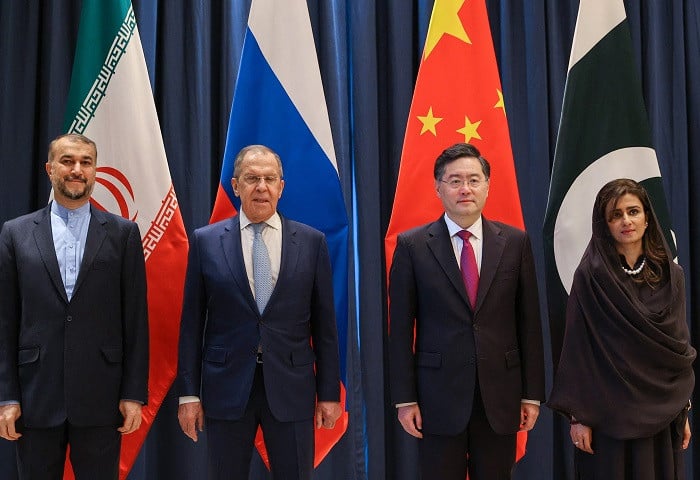
Top diplomats from China, Russia, Pakistan and Iran on Thursday met in Uzbekistan to discuss the evolving situation in Afghanistan with participants voicing concerns over some of the actions taken by the interim government in Kabul.
While foreign ministers of China, Russia, and Iran attended the second quadrilateral group meeting on Afghanistan, the Pakistani side was represented by Minister of State for Foreign Affairs Hina Rabbani Khar.
The quadrilateral group also attended a separate meeting of the Neighbouring Countries of Afghanistan in Samarkand. Amir Khan Muttaqi, the acting afghan foreign minister, also attended the meeting where some countries voiced their concerns over the Taliban’s move of banning girls’ education and failure in tackling terrorist groups.
The Neighbouring Countries of Afghanistan mechanism was established in 2021 on Pakistan’s initiative with a view to evolving a regional approach on the situation in Afghanistan.
Pakistan hosted the first meeting of the foreign ministers of Neighbouring Countries on September 8, 2021, and participated in the second meeting held two months later in the capital of Iran, Tehran. The third meeting was held in Tunxi, China in March 2022.
The mechanism will contribute towards forging consensus among the neighbouring countries of Afghanistan, who are among the direct stakeholders of the situation in Afghanistan.
“We are meeting at a critical juncture. Afghanistan currently faces multiple and mutually reinforcing challenges. The humanitarian situation in the country remains grim, with a staggering 28 million people – over 2/3rd of the population, requiring urgent humanitarian assistance to survive,” Khar said while addressing the conference.
“The menace of terrorism continues to blight the lives of Afghan people on a daily basis. The threat posed by terrorist organisations to the neighbouring states and the region has accentuated,” she pointed out.
The state minister said that at a time when the Afghan people needed the international community the most, “we see the world moving away”, closing doors on the common Afghan citizens.
“Growing voices, especially in the West, are advocating a complete break from Afghanistan to offload its problems on the neighbourhood and to walk away,” Khar continued.
“There are clear indications that humanitarian support to Afghanistan will see a significant decline this year. Some are even questioning the utility of engaging the interim Afghan government,” she said.
“We believe that these approaches are misplaced and need to be re-assessed. We must not repeat the [past] mistakes – abandoning the people of Afghanistan is always a bad choice.”
However, she voiced concern over some of the policies and actions of the interim Afghan government, something that did not help the cause of the people of Afghanistan.
“The decision to suspend education for women and girls and to prevent them from working for national and international NGOs is regrettable,” she said.
“Not only that it deprives the enterprising Afghan women and girls of their rightful opportunities to progress and advance, and to secure gainful employment, but also restrains the helping hand of many friends and well-wishers of Afghanistan,” she added.
Khar told the meeting that Pakistan voiced its disappointment with this decision.
“We believe the right to education is not a favour to women to be dispensed at will, it is a fundamental human right, as enshrined in our noble religion, and the teachings of the Holy Prophet (PBUH).”
She also spoke about the terrorist threat emanating from Afghanistan. “We also believe that more needs to be done to eradicate the foothold of terrorist organisations from Afghanistan without distinction and in a concerted and uniform manner,” Khar said.
“Greater cooperation and coordination with the interim Afghan government remains critical. We look forward to working closely with the neighbouring states and the international community to this end,” she continued.
Meanwhile, the quadrilateral group agreed on several measures, including call for the US to lift its unilateral sanctions against Afghanistan and appeal to the Afghan authorities to build an inclusive government that protected the interests of all people, including women, children, and ethnic minorities.
At a news conference after the meeting, Chinese Foreign Minister Qin Gang voiced concern over the Afghan authorities’ recent decision to ban Afghan women from working with the United Nations in Afghanistan.
However, Qin also told reporters that although the issue of women’s rights and interests was important, it was not the whole problem of Afghanistan, nor had it been the core and root cause of the Afghan problem.
The international community should look at the Afghan issue in a comprehensive, balanced, and objective manner, he said, stressing that the Afghan problem needed a comprehensive and systematic solution.
Meanwhile, Khar held bilateral meetings with Russian, Chinese, Iranian as well as foreign ministers of central Asian countries.







1731998460-0/Express-Tribune-(1)1731998460-0-270x192.webp)










COMMENTS
Comments are moderated and generally will be posted if they are on-topic and not abusive.
For more information, please see our Comments FAQ